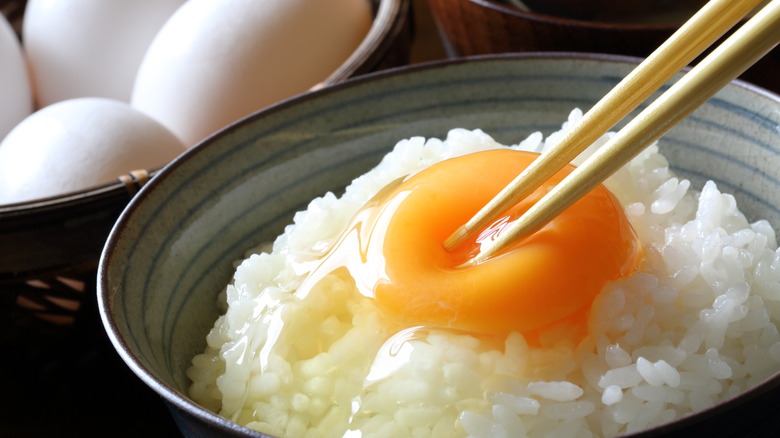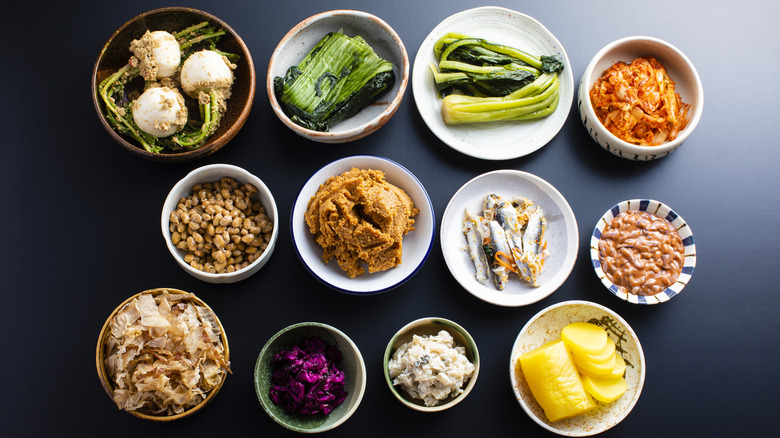The 2-Ingredient Japanese Breakfast That's Too Easy Not To Try
Breakfast is all about simplicity and convenience, and sometimes, that means sacrificing the flavors. But, this doesn't always have to be the case. With the right ingredients, you can have it both ways and be in and out of the kitchen in no time with delicious food to start the day. There's no need to overthink it — just egg and rice will do the trick. These two are all you need to whip up tamago kake gohan — a very popular Japanese breakfast food.
The long-time traditional staple of many Japanese households has a unique origin story. A journalist from the Meiji era (1868 to 1912) is believed to have popularized the specialty. However, its popularity has grown tremendously in recent years, with restaurants specializing in this dish and frequent appearances in anime and movies. There's even an annual tamago kake gohan festival in Tokyo that celebrates the dish and offers opportunities to try different brands of the main ingredients. Branching beyond its home country, you might also see this dish plenty on social media, food blogs, and at Japanese restaurants around the world.
An exceptional breakfast made with just two (or three) ingredients
Tamago kake gohan literally translates to egg on rice, and that's pretty much what it entails. Raw egg is cracked over cooked rice, with an optional splash of soy sauce or dashi for extra umami. Mix everything together and you're done. The buttery egg coats every fluffy rice grain, creating a velvety rich texture that melts the creamy flavors onto your taste buds. Steaming hot and infused with familiarity, it's a sense of comfort you can create for very little effort.
Eating raw eggs sounds a little perilous by Western standards, but in Japan, where the domestic egg production process is strictly hygienic, it's a common practice. If you're making this dish at home, make sure to pick out clean, fresh eggs that are already pasteurized. For those who want to use cooked eggs, consider making coddled eggs or onsen tamago (Japanese hot spring egg). Although not entirely the same, they do have a liquid thickness that offers a similar textural effect.
As for the rice, one that's freshly cooked arguably makes for the best experience because it's tender and warm, allowing for an extra luscious experience when mixed with the egg. That said, feel free to make do with lukewarm or even leftover rice as long as it's convenient for your routine. If possible, use Japanese short-grain rice for a sublime stickiness and subtle fragrance that pairs well with the egg.
You can still jazz up your tamago kake gohan
With this dish's simplicity comes endless potential for topping creativity. Don't hesitate to spruce it up to keep the eating experience exciting. Furikake and togarashi are popular spice blends that take things up a notch with just a sprinkle. The first one is nutty while the latter offers a spicy spark. We also can't forget sesame seeds and dried nori flakes, both of which bring umami depth to the dish. There's also tarako, pollock fish roe that is mildly briny, and its spicy counterpart, mentaiko. For those who like it salty, bonito flakes are the perfect choice.
Branching beyond Japanese cuisine, folks who want a kick of heat might enjoy chili flakes, or perhaps kimchi, for a hint of acidity. Add pops of green with your veggies of choice, such as microgreens, green onions, leafy greens, or perhaps even a few slices of avocado. As always, cheese and butter do a marvelous job of enhancing the dish's creaminess. Leftover proteins from last night's dinner work, as well, if you want to amp up the savory element.
Got some more time? Accompany the tamago kake gohan with other Japanese breakfast foods and side dishes for a satisfying meal. Keep it light and easy with a bowl of miso soup, pickled vegetables, or natto — sticky fermented soybeans typically served with rice. While you've got the rice, make onigiri for a substantial meal, if that's what you're craving.


